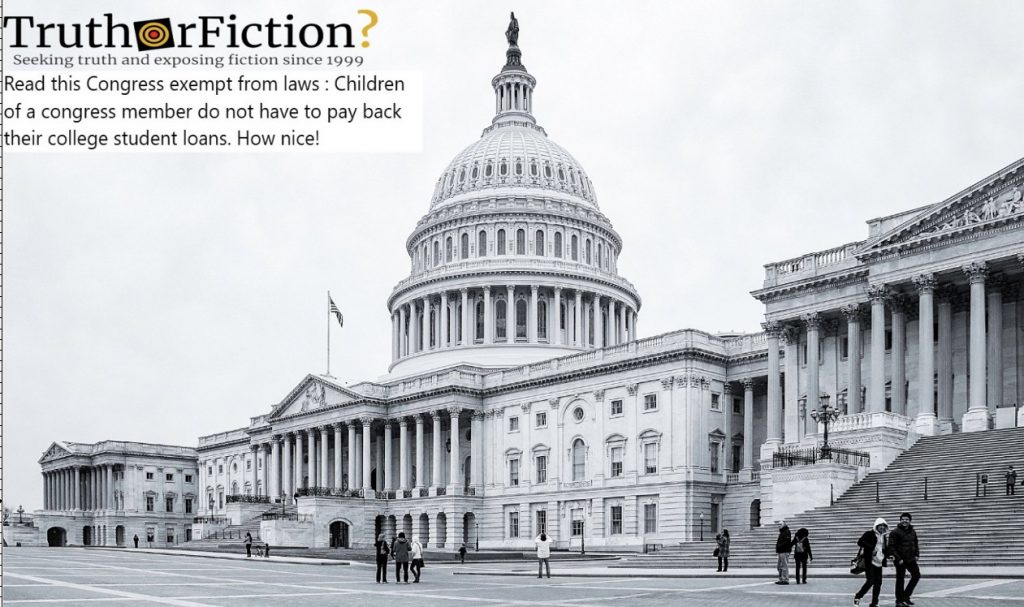A throwaway — and false — claim on a Fox talk showin 2010 snowballed into a chain email pushing disinformation about federal lawmakers’ student loan obligations.
The idea that a Congressmember’s family and staff do not have to repay their college loans originated on disinformation purveyor Sean Hannity’s show in August of that year, when political operative Dick Morris claimed:
Do you know — my wife Eileen just told me yesterday that staff in the House of Representatives and in the Senate do not pay student loans back? The government pays it for them?
Morris further claimed that the House of Representatives “spent $25 million paying the salary [and] student loans of their staffers” in 2009. His remarks were spun into a chain email that, as often happens, was further laundered onto social media as a text meme saying:
Children of Congress members do not have to pay back their college student loans.
Staffers of Congress family members are also exempt from having to pay back student loans.
Members of Congress can retire at full pay after only one term.
Members of Congress have exempted themselves from many of the laws they have passed, under which ordinary citizens must live.
For example, they are exempt from any fear of prosecution for sexual harassment.
And as the latest example, they have exempted themselves from Healthcare Reform, in all of its aspects.
The U.S. Office of Personnel Management (OPM) does offer a student loan repayment program to federal agencies — not the House — so that they may use it as “a recruitment or retention incentive” for current or prospective employees, including lawmakers or members of the Executive Branch.
According to the OPM website:
Although the student loan is not forgiven, agencies may make payments to the loan holder of up to a maximum of $10,000 for an employee in a calendar year and a total of not more than $60,000 for any one employee.
The agency’s most recent report, covering congressional year 2020, stated that 9,500 employees from 58 federal agencies made use of the repayment program and received $76.7 million.
Some versions of the copypasta also include a bogus claim about a movement to institute a 28th Amendment to the Constitution:
Governors of 35 states have filed suit against the Federal Government for imposing unlawful burdens upon their states.It only takes 38 (of the 50) States to convene a Constitutional Convention.
The allegedly proposed amendment would read:
Congress shall make no law that applies to the citizens of the United States that does not apply equally to the Senators, Representatives of Congress; and, Congress shall make no law that applies to the Senators and/or Representatives that does not apply equally to the citizens of the United States …
As we reported in 2013, there is no evidence that lawmakers or their staff members had “exempted” themselves from healthcare reform; instead they actually make use of DC Health Link, the Affordable Care Act’s healthcare exchange for the District of Columbia. Around 11,000 Congress members and staffers have reportedly signed up for the service.
The issue of student loan forgiveness gained renewed attention amid the COVID-19 pandemic. The Coronavirus Aid, Relief, and Economic Security (CARES) Act, signed into law by then-United States President Donald Trump in March 2020, introduced the first pause on loan repayments.
After defeating Trump in that year’s presidential election, U.S. President Joe Biden subsequently extended the holding period. But his administration later implemented a plan canceling loan obligations for some debtors and offering partial loan forgiveness for others.
That plan was later challenged in court, and is slated to go before the Supreme Court on February 28 2023. As CNN reported, the high court is to hear arguments in two cases concerning the program:
One case was brought by six Republican-led states that say they would be harmed financially if the forgiveness program goes into effect. The other case was brought by two borrowers in Texas who don’t fully qualify for debt forgiveness under the program.
Plaintiffs in both lawsuits argue that the administration does not have the authority to cancel the student loan debt under the proposed rules of the program. But the Biden administration argues that a 2003 law grants the executive branch the power to discharge federal student loan debt in the event of a national emergency, including the Covid-19 pandemic.
The U.S. Department of Education has said that student loan payments will resume either 60 days after the matter is resolved in court or 60 days after June 30 2023, whichever comes first.
Update 2/27/2023, 2:16 p.m. PST: This article has been revamped and updated. You can review the original here. — ag
- U.S. Office of Personnel Management - Student Loan Repayment
- Cornell Law School -- 5 U.S. Code § 2105 - Employee
- The Relationship Between Congress and Obamacare
- Biden's Student loan Forgiveness Plan Goes Before the Supreme Court Tuesday. Here's What Borrowers Need to Know
- Timeline: Federal Student Loans During the COVID-19 Pandemic
- Millions of Borrowers Have Had Billions in Student Loan Debt Erased, and There's More to Come. Here's How.

